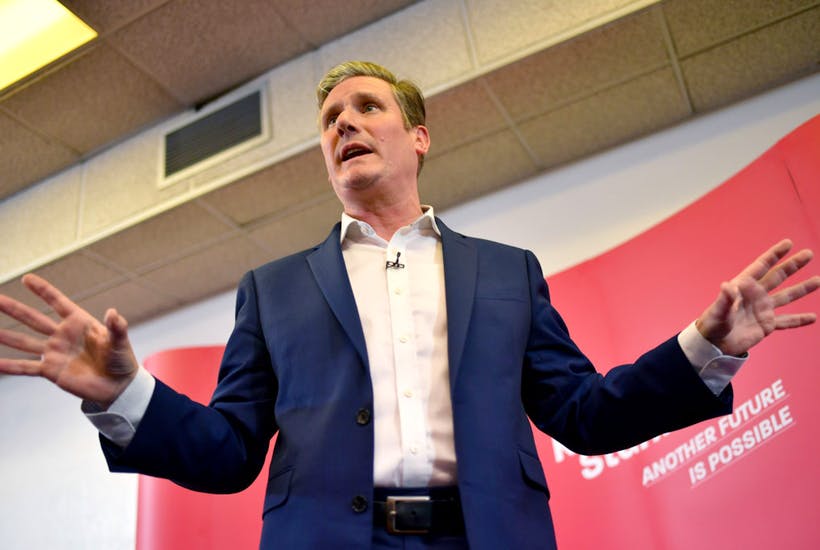Keir Starmer has been described as a ‘moral leftwinger’. He certainly liberally peppered his leadership campaign launch speech with references to Labour’s ethical correctness, describing his campaign as a ‘moral fight against poverty, inequality and injustice’. It is understandable why Starmer praised Labour members’ collective moral superiority: he needs their votes. In doing so, Starmer is following in a time-honoured tradition of flattering party members. But there are pitfalls with this pandering approach, as Jeremy Corbyn’s leadership shows.
It was way back in 1962 that Harold Wilson told Labour’s annual conference:
‘This party is a moral crusade or it is nothing’.
It was a line that proved so popular with party gatherings Wilson repeated it on numerous other occasions. Back then, Wilson spoke to a party that, as today, had been out of office for over a decade. Yet despite having lost three general elections in a row, he still claimed Labour sought more than a Commons majority: it wanted voters to give the party a ‘socialist mandate’ so it could pursue its ultimate ambition: ‘social justice’.
Wilson set the bar high. So high in fact that despite his governments passing legislation that challenged racial discrimination, legalised homosexuality and set down the principles of equal pay between men and women, when resigning as leader in 1976 he was regarded by many in the party as a moral leper.
When he died in 1995, Tony Blair quoted Wilson’s 1962 speech to claim his predecessor as Labour leader was more than the slippery character many ruefully remembered.
Wilson, Blair argued, really did have a moral commitment to social justice. Perhaps he was thinking of how members saw himself, for later that year Blair reassured conference that the recently unveiled New Labour also had an ethical core.
Blair subsequently claimed he had joined the party precisely because of its adherence to ‘a moral purpose to life, a set of values, a belief in society, in co-operation, in achieving together what we cannot achieve alone. … I am worth no more than anyone else, I am my brother’s keeper, I will not walk by on the other side’.
This nonetheless did not save him from the opprobrium to come.
Wilson and Blair felt obliged to highlight their party’s morality because so many members saw Labour’s purpose as having a determining ethical dimension. Indeed, such is Labour’s presumed moralism, journalists habitually and unthinkingly refer to the ‘battle for the soul of the Labour party’ whenever its future is in contention. They do not say that of the Conservatives! For if Labour was formed by hard-headed trade unionists, it was also created by socialists and nonconformists who fervently believed in the material and moral transformation of society and all the individuals in it.
If the unions supplied the cash the latter were vital to running the party on the ground: they voluntary gave their time to keep local parties going because they saw in Labour the vehicle that best expressed their own values.
But in order to win office and translate those values into legislation most Labour leaders recognised the need to win over voters who were not keen for their own moral improvement. They were likely to be impressed by the promise of a better run economy from which they would benefit than by Labour’s grand moral claims. In fact they might not even agree with some them. So far as the party’s moralists were concerned however, appealing to such sometime Tory voters was an unpleasant necessity.
But then Jeremy Corbyn came along and everything changed. Since 2015, Labour members have been told they no longer needed to compromise their moral precepts. The party could be true to its ethical inspiration and still win power with a socialist mandate if they believed in it fervently enough, chased out doubters from their ranks and took to the streets ready to share the good news with the electorate.
And with Corbyn being a leader that many considered had been consistently on the right side of history he was the perfect figure to give credence to this message. As a result – perhaps for the first time – Corbyn made members feel at ease with themselves.
This approach was one of the factors that led to Labour’s worst general election result since 1935. As Blair recently wrote ‘deluding ourselves that belief in our own righteousness’ is enough to win power can only lead to disaster.
Yet if defeat in December has led some to question aspects of the Corbyn years, it will still be a tricky task for any successor to wean members off their vaunting sense of moral superiority.
This will be much needed if Labour is to have any hope of re-establishing a connection with the country as it is, rather than as members wish it to be. So whether it is Starmer, Long Bailey, Nandy, Phillips or Thornberry, the next leader needs to guide the party back to a more pragmatic approach to politics. One which gives space to compromise with the electorate and avoids being condemned for betraying Labour values.
It won’t be easy – so perhaps Starmer needs to be braver as the campaign develops and ask members to start showing a little self-criticism.
Steven Fielding is professor of political history at the University of Nottingham and is writing ‘The Labour Party: from Callaghan to Corbyn’ for Polity Press, to be published in 2021. On Twitter he is @PolProfSteve






Comments